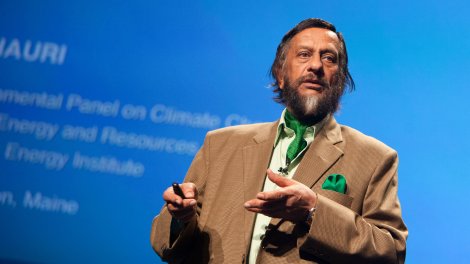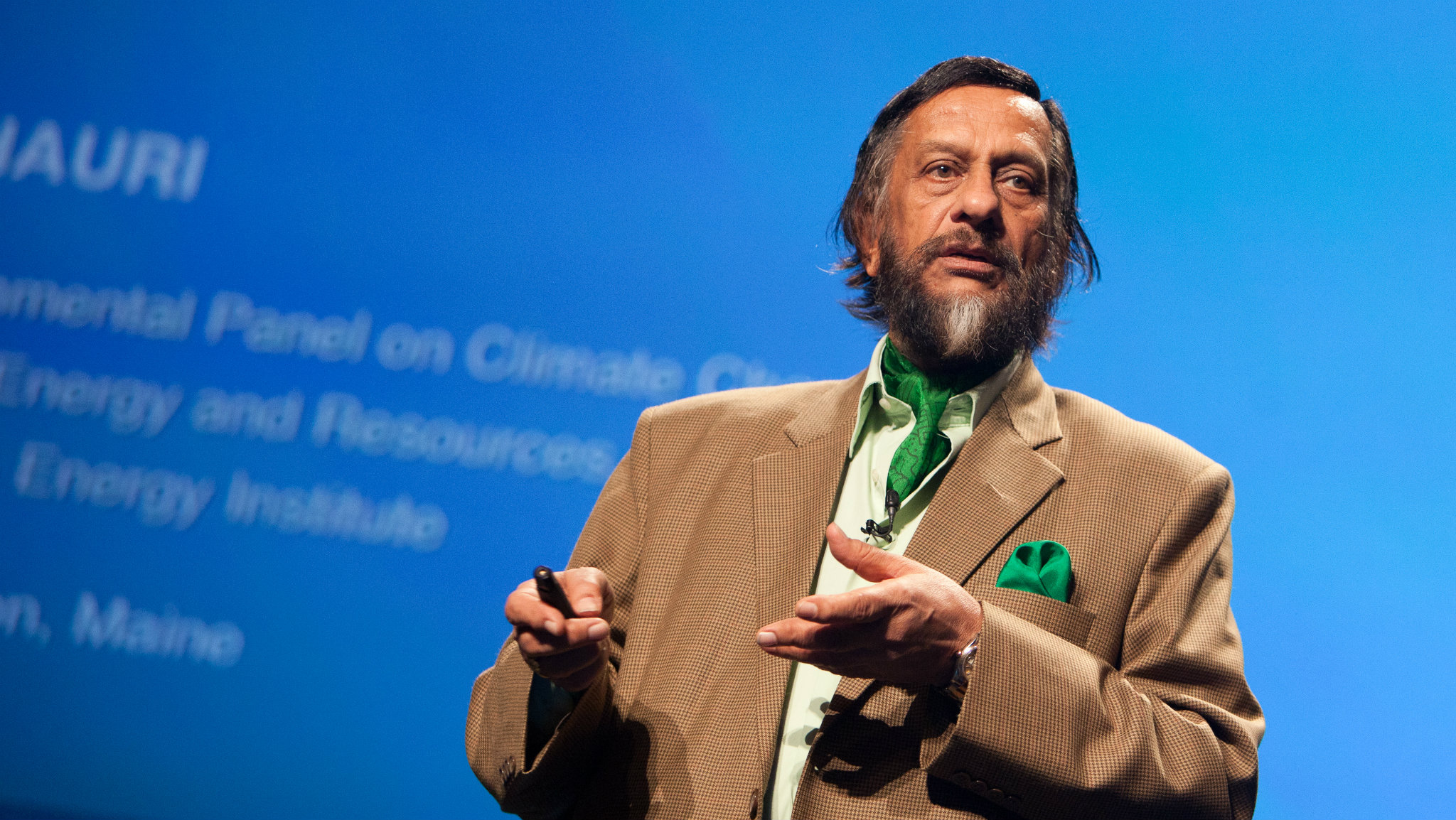
Kris KrügRajendra Pauchari, chair of the IPCC, tells us to get a move on.
So far, climate change is following the plot of an epic disaster movie.
In the last few years, giant megafires have burned out of control, we’ve been hit with superstorms, our fields have wilted, and there’s barely any ice left at the North Pole. Despite all we think we’ve done so far to change course, emissions are still increasing.
We’ve now advanced to the part when the world’s best scientists emerge from their conclave to announce a range of possible plans that could save us from going over the climate cliff.
On Sunday, they made their announcement, calling for a “fundamental decarbonization” of the world economy. Sounds daunting, but overwhelmingly the message from scientists to the world was one of hope.
[tweet https://twitter.com/PIK_Climate/statuses/455280101094330368]Unlike so many previous climate change reports, this time there’s significant good news: The world doesn’t need to sacrifice economic growth to get the job done. The task can largely be achieved with existing technology. And hey, we’ll end up with a better planet at the end, too.
Now, we just need to take action. World, this is our Ben Affleck moment.
The leading United Nations climate science body has just completed a seven-year-long update on the problem of and possible solutions to climate change. The first report in this series said that on our current path, climate change would soon become irreversible. The second report, earlier this month, said those changes are already destabilizing human society.
The latest in a series of reports from the Intergovernmental Panel on Climate Change, out Sunday, tells us how to get the planet back on track. The report, assembled by scientists and political representatives from nearly 200 countries, is the most comprehensive and influential summary ever created of how the world can stop climate change.
The basic message is simple: We share a planet. Let’s start acting like it.
Climate change is what economists call a global commons problem. We’ve solved them before (acid rain, the ozone hole) but none on this scale. In the report’s words, “effective mitigation will not be achieved if individual agents advance their own interests independently.” By working together, individual people, cities, and countries can be much more effective in transitioning to a world without fossil fuels.
“There is a clear message from science: To avoid dangerous interference with the climate system, we need to move away from business as usual,” said Ottmar Edenhofer of the Potsdam Institute for Climate Impact Research, a co-chair of the report.
The report notes where “business as usual” has gotten us so far, led mainly by growth in population and the economy:
- Greenhouse gas emissions from 2000 to 2010 were the highest in human history.
- Half of all emissions between 1750 and 2010 occurred in the last 40 years.
- Recently, increased reliance on coal “has reversed the long‐standing trend of gradual decarbonization of the world’s energy supply.”
In other words, despite all our efforts to make it better, we’re actually making it worse. Our emissions are accelerating.
Instead, what’s needed is a decoupling of economic growth and climate-crippling fossil fuel energy sources. The report goes on to crunch the numbers of how much it will cost to turn our civilization around.
[tweet https://twitter.com/LeoHickman/statuses/455285217021153280]Turns out, it’s cheap. To create a scenario where global temperatures are “likely” to remain less than 2 degrees Celsius above pre-industrial levels (the globally agreed-upon threshold after which “dangerous” climate change is apt to begin), we’d need to have around one-quarter of our energy mix from low-carbon sources by the year 2030. That fraction increases to about 60 percent by 2050.
[tweet https://twitter.com/rtcc_sophie/statuses/455282734702022656]According to an economic analysis within Sunday’s report, an investment to stop climate change will only knock 0.06 percentage points off the world’s annualized economic growth rate from now till the end of the century. Assuming annualized growth of about 3 percent, full-scale motivation on climate change would reduce that to about 2.94 percent. Not bad. Side effects that weren’t factored in to that calculation may include: more efficient and productive food systems, human health improvements, biodiversity protection, poverty reduction — in general, making things better.
Or we can continue on the business-as usual-path and see how that goes.
The IPCC is restricted from making any specific policy recommendations. Instead, its job is to figure out what our options are.
The new report lays out a litany of tradeoffs, cost-benefit analyses, and other wonkery designed to guide global action on climate change. The goal is to be “policy relevant, but not policy prescriptive,” especially in anticipation for the international climate treaty that’s scheduled to be hashed out in Paris next year.
As the report explains, a full-scale phase out of fossil fuels needs to be well underway within the next 15 years. After that point, costs increase and options diminish significantly. Motivating collective action on the scale necessary to transform our economy in that short time frame is the hard part.
Some of the possible solutions the report proposes are familiar, like more efficient modes of transportation and the development of more compact cities that encourage public transportation, bicycling, and walking, especially in the rapidly urbanizing parts of the world.
But the report also emphasizes that there are things we take for granted today that will need to change for an aggressive phase-out of fossil fuels to become reality. Reliance on short-haul air travel could be winnowed by investment in high-speed rail. New industrial processes may need to be invented, like alternatives to cement, whose production is especially carbon intensive.
[tweet https://twitter.com/JPvanYpersele/statuses/455286636231032832]Even then, the world may have to invest in sci-fi technologies like atmospheric carbon dioxide removal to keep greenhouse gases at safe levels. The report stresses these sort of last-ditch technologies “carry side effects and long-term consequences on a global scale.”
Delaying action past 2030 will necessarily require a larger reliance on unproven technologies and forces a much quicker ramp up of clean energy after that point.
In fact, among the 900 scenarios the report authors examined, if greenhouse gas concentrations remain above current levels in 2030, “many models … could not produce scenarios reaching atmospheric concentration levels that make it as likely as not that temperature change will remain below 2 degrees C relative to pre‐industrial levels.” That means, there’d be no realistic pathway remaining to avoid dangerous climate change.
In the end, the report’s theme is that the most cost-effective way for systemic change to occur is by coordinating action on the global scale. If we don’t work together, the price of action will increase on the whole, action could be delayed or counter-productive, and the economy could needlessly suffer.
The report essentially puts a nail in the coffin to the idea of European-style cap-and-trade, saying existing policies of that sort “have not proved to be constraining to carbon emissions” due to a variety of factors. Instead, countries considering climate policies should consider reducing subsidies for continued fossil fuel production, low-carbon consumer labeling like the U.S. government’s Energy Star, and revenue-neutral tax-based policies like the one in British Columbia.
Much of the report is focused on the actions of governments and other large-scale bodies. So what can individuals do? The report could provide a bump of support to the growing divestment movement. It states, simply: “[M]itigation policy could devalue fossil fuel assets, and reduce revenues for fossil fuel exporters.” In other words, it’s not a great time to be a coal tycoon.
[tweet https://twitter.com/suzyji/statuses/454388008242786304]In a major speech last summer, President Obama effectively endorsed this movement.
Divestment is a way that individual institutions can motivate a change on a systemic scale. It’s a way that bottom-up solutions could drive global debate. It’s a way to turn hope into action.
Future Tense is a partnership of Slate, New America, and Arizona State University.
 This story was produced by Slate as part of the Climate Desk collaboration.
This story was produced by Slate as part of the Climate Desk collaboration.



